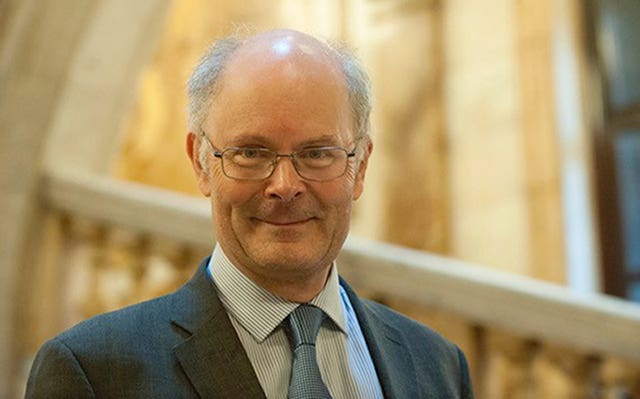
Polling expert Professor Sir John Curtice has said he “would be surprised” if the Conservatives do not lose some of their 13 seats in Scotland.
The Strathclyde University professor told BBC Radio Scotland’s Good Morning Scotland programme on Friday that polls currently put the SNP on around 40% of the vote, while Labour has dropped to 20% north of the border.
His comments come at the end of the first full week of official campaigning ahead of the December 12 General Election.
READ MORE: Polling expert Sir John Curtice compares Boris Johnson to a Ming vase
Sir John said: “The SNP look as though they’re around 40%, which is about three points up on where they were in 2017, so they’re at least holding on, probably going up.
“The polls are very clear, unsurprisingly given the state of the Labour Party’s poll position in the UK as a whole, that they are well down in Scotland – probably heading for around 20% of the vote and therefore down seven, eight or nine per cent.
“A slight question mark over the Conservatives, recent polls still had them down about seven points in Scotland, but given they have been making some ground across the UK as a whole and there’s something of a Brexit Party vote to squeeze in Scotland, it would be surprising if the Conservatives were not at risk of losing some of their seats.”
 Professor Curtice teaches at Strathclyde University (Strathclyde University/PA)
Professor Curtice teaches at Strathclyde University (Strathclyde University/PA)
The professor also claimed it is a “widespread misapprehension” that Labour voters are not in favour of Scottish independence.
He said: “If you look at the polling evidence in Scotland, sure, a majority of Labour voters in Scotland are in favour of staying inside the union.
READ MORE: Prof John Curtice: SNP need England to reject Boris Johnson
“But the polls consistently find in the high 30% of those who say they are going to vote Labour, are in favour of independence.
“The Labour Party have always been the centre party on the constitutional question in Scotland, it is still the centre party on the constitutional question.
“As a result, it tends to draw support from both sides of the spectrum, but it does leave the party with something of a dilemma about how it keeps these groups together.
“In the 2015 election it lost a large chunk of its independence supporting supporters.
“As compared with the Conservative Party, Labour’s vote in Scotland is very different. The party is much more able to pick up votes from independence supporters than the Conservatives.
“That said, the Labour Party doesn’t look like it’s going to have enough voters in either camp to look like it’s going to be a credible challenger.”



Why are you making commenting on The Herald only available to subscribers?
It should have been a safe space for informed debate, somewhere for readers to discuss issues around the biggest stories of the day, but all too often the below the line comments on most websites have become bogged down by off-topic discussions and abuse.
heraldscotland.com is tackling this problem by allowing only subscribers to comment.
We are doing this to improve the experience for our loyal readers and we believe it will reduce the ability of trolls and troublemakers, who occasionally find their way onto our site, to abuse our journalists and readers. We also hope it will help the comments section fulfil its promise as a part of Scotland's conversation with itself.
We are lucky at The Herald. We are read by an informed, educated readership who can add their knowledge and insights to our stories.
That is invaluable.
We are making the subscriber-only change to support our valued readers, who tell us they don't want the site cluttered up with irrelevant comments, untruths and abuse.
In the past, the journalist’s job was to collect and distribute information to the audience. Technology means that readers can shape a discussion. We look forward to hearing from you on heraldscotland.com
Comments & Moderation
Readers’ comments: You are personally liable for the content of any comments you upload to this website, so please act responsibly. We do not pre-moderate or monitor readers’ comments appearing on our websites, but we do post-moderate in response to complaints we receive or otherwise when a potential problem comes to our attention. You can make a complaint by using the ‘report this post’ link . We may then apply our discretion under the user terms to amend or delete comments.
Post moderation is undertaken full-time 9am-6pm on weekdays, and on a part-time basis outwith those hours.
Read the rules hereLast Updated:
Report this comment Cancel